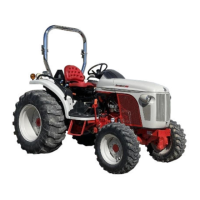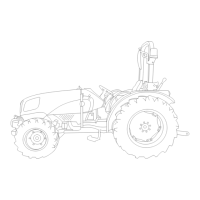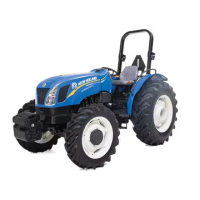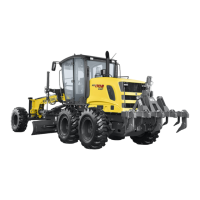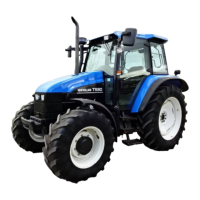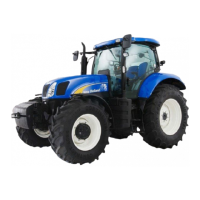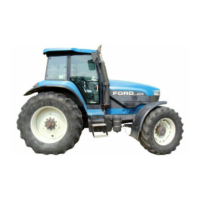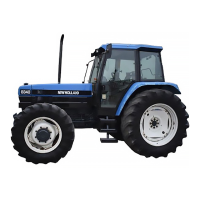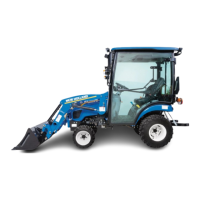7 - MAINTENANCE
General specication - Biodiesel fuels
Biodiesel usage in NEW HOLLAND products
Introduction to Fatty Acid Methyl Ester
(FAME) biodiesel
FAME biodiesel, called biodiesel fuel in the following sec-
tion, consists of a family of fuels derived from vegetable
oils treated with methyl esters.
There are two main biodiesel fuel types: Rapeseed
Methyl Ester (RME) and Soybean Methyl Ester (SME).
RME is a blend of rapeseed and sunower methyl ester,
and is the preferred crop in Europe. SME is the preferred
crop in the United States.
Biodiesel fuel is a renewable alternative fuel source. Its
use and development is promoted worldwide, especially
in Europe and in the United States.
NOTICE: Your emissions control system is compatible
with up to 20% biodiesel fuel (B20). Be aware that the use
of biodiesel fuel that does not comply with the standards
mentioned in this section could lead to severe damage to
the engine, fuel system or aftertreatment system of your
machine. The use of non-approved fuels may void NEW
HOLLAND Warranty coverage.
Biodiesel can be used to run Tier 4B (nal) and Stage IV
diesel engines only when blended with standard diesel
fuel:
•
B5: indicates the blend of 5% biodiesel and 95% diesel
fuels.
•
B20: indicates the blend of 20% biodiesel and 80%
diesel fuels.
Biodiesel fuel has several positive features in comparison
with diesel fuel:
•
Biodiesel fuel adds lubricity to the fuel, which is bene-
cial in many circumstances, particularly as sulfur and
aromatics are removed from the fuel.
•
Biodiesel has a greater cetane number and burns
cleaner.
•
Biodiesel produces less particulate matter and reduces
smoke emissions.
•
Biodiesel is fully biodegradable and non-toxic.
Diesel and biodiesel fuel specications
Tier 4B (nal) and Stage IV diesel fuel specications are
covered by the following:
•
ASTM D975, Standard Specication for Diesel Fuel
Oils. (15 ppm sulfur maximum.)
Biodiesel blends are covered by:
•
United States Diesel Fuel Specication ASTM D975 al-
lows up to 5% biodiesel since 2009. United States fuel
suppliers are allowed to use up to 5% biodiesel fuel (B5)
to supply the network.
•
United States Biodiesel Fuel Specication ASTM
D7467 provides specications for diesel and biodiesel
blends from B5 to B20.
Pure biodiesel blend stock (B100) specication is
covered by the following requirements:
•
ASTM D6751 - Standard specication for biodiesel fuel
blend stock (B100) for middle distillate fuels.
NOTE: ASTM D6751 specication has been updated
to improve the quality of biodiesel in the market place.
Before raw oil can be converted into usable biodiesel
fuel, it must undergo transesterication to remove glyc-
erides. During the transesterication process, the oil
reacts with an alcohol to separate the glycerine from
the fat or vegetable oil. This process leaves behind two
products: methyl ester (the chemical name for biodiesel)
and glycerine (a byproduct usually sold for use in soaps
or other products).
NOTICE: Biodiesel fuels approved for use in the NEW
HOLLAND equipment must be transesteried and comply
with the latest North America Standard ASTM D6751.
NOTICE: Cold Pressed Biodiesel, Cold Pressed Oil,
Straight Vegetable Oil (SVO), or more generally unre-
ned vegetable oils used as motor fuel, are fuels that are
normally made from Rapeseed oil or similar high oil con-
tent crops. These kinds of fuel are not transesteried, so
they do not full the ASTM D6751 requirements. There is
no recognized quality standard available for these types
of fuel. Therefore the use of Cold Pressed Biodiesel,
Cold Pressed Oil, Straight Vegetable Oil (SVO), or more
generally unrened vegetable oils used as motor fuel are
NOT APPROVED at any blend in any NEW HOLLAND
product.
NOTICE: Any engine and fuel injection equipment tted
to a NEW HOLLAND vehicle found to have run with any
blend of NON-APPROVED fuel (fuel not fullling the spec-
ication described in the requirement ASTM D6751) will
no longer be covered for Warranty by NEW HOLLAND.
Biodiesel fuel usage conditions
You must stringently follow the biodiesel fuel usage con-
ditions. Incorrect application of the biodiesel fuel usage
conditions could lead to severe damage to the engine,
fuel injection equipment and aftertreatment system.
The main concerns related to operation with biodiesel
fuels are:
•
Filters and injector blockage caused by poor fuel qual-
ity.
•
Wear and corrosion of internal components due to wa-
ter content, which affects lubricity.
7-4

